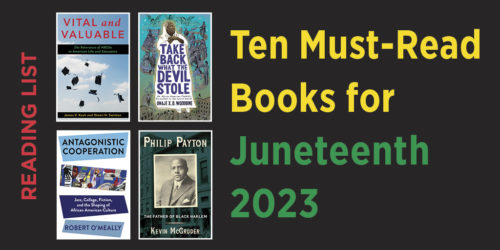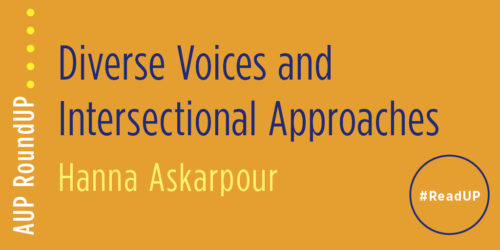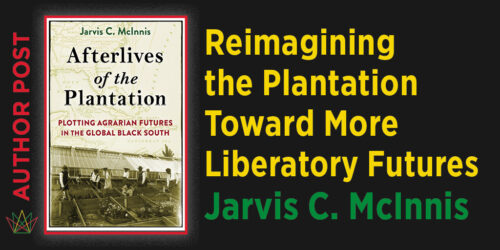Setting the Stage
Shalini Kudinoor

This June, we proudly commemorated Pride Month and Juneteenth, both times of reflection rooted in resistance, visibility, and identity. University presses used this time to consider how history is recorded and whose stories are heard. Learning from their blogs, I have been thinking about the power of storytelling as a force for both memory and transformation, inviting us to rethink what we know and revealing layers of history too long overlooked. This RoundUP sets the stage for those storytellers, with a lineup of posts from presses that amplify queer lives, empower people of color, and honor those shaping how we remember and imagine the future.
In this Q&A, Averill Earls discusses Love in the Lav, her deeply researched and emotionally resonant history of same-sex-desiring men in twentieth-century Ireland, where their sexuality was illegal. Earls spotlights everyday queer lives long buried in police files and archives, revealing not only criminalization but also tenderness and community. I find that Earls’s work stands out for its empathy and for centering love as a form of historical evidence, calling for more representation of “queer Irish history beyond the criminal record.” Her message is crystal clear: This is just scratching the surface of many stories still needing to be uncovered.
Duke University Press highlights River Pruitt’s article “Approaching Our Futures with Care,” which explores how Indigiqueer and Two-Spirit speculative fiction imagines futures shaped by care, kinship, and survival rather than fear. Through close readings of Adam Garnet Jones and jaye simpson, Pruitt introduces aftercare as a method of reading that honors the emotional and political weight of queer Indigenous storytelling. Their work positions radical care as a literary force and a future-making tool where mourning and love exist side by side. Overall, this post reminds us that reading with kindness can help us understand what others have been through.
How did a period of growing inclusion give way to a surge of antitrans legislation? The authors of The Remarkable Rise of Transgender Rights revisit this very question. They trace how early political and legal victories were met by calculated strategies from political elites using trans issues to mobilize their base. The authors’ research reveals that public opinion isn’t driving these rollbacks in legislation; in fact, the audience remains unsettled and open to influence. The public hasn’t turned away. However, where things go next depends on whether voices for trans equality can break through the noise.
In this excerpt from This Is Rhythm, Gayle F. Wald reveals a lesser-known chapter in the life of the children’s music legend Ella Jenkins. It tells of her quiet but enduring same-sex partnership and her search for independence and identity in midcentury America. Wald reconstructs how Jenkins navigated her sexuality privately in times that offered few affirming spaces for Black queer women. Wald’s portrait is a deeply human story of self-discovery, love, music, and resilience. The text frames Jenkins’s life lived beyond labels and the courage it took to live authentically while still keeping the curtains closed.
In honor of Juneteenth, NYU Press highlights Deborah Willis’s The Black Civil War Soldier, featuring over seventy photographs of soldiers who used portrait photography as radical self-assertion. In an era when Black men were told they were “subhuman,” their portraits became acts of defiance and dignity. Willis pairs these photos with personal letters and artifacts, revealing the journeys behind the uniforms. Her work illustrates how visual documentation records soldiers’ memories, preserving “their hopefulness and the sense of what could be won from loss.”
In this Q&A, Kimberly Akano interviews Keisha N. Blain about the launch of Global Black Thought, a new journal from Penn Press and the African American Intellectual History Society. Blain reflects on the urgent need to center Black intellectual traditions over time, across the diaspora, and across the globe. From Zora Neale Hurston’s musical theater work to early Black feminist thought, the journal challenges what counts as intellectual history and who gets to define it. Blain’s vision is to build a scholarly stage that is rigorous, inclusive, and unapologetically Black.
In celebration of Juneteenth, University of Illinois Press curated a reading list that uplifts Black traditions, covering themes across spirituality, reparations, classrooms, and more. Personally, I look forward to reading Justice Batted Last, Don Zminda’s compelling account of how Ernie Banks and Minnie Miñoso integrated Chicago baseball while the city grappled with deep racial unrest. Check out the full list on their blog..
IN CLOSING
These presses remind us that liberation and storytelling are deeply intertwined. By empowering marginalized narratives, authors create a collective portrait of resilience across time and place. Bringing these scholarly conversations together, we learn from the people who fight against injustice and demand to be heard. To them, it’s not only the story of liberation that is important but also the freedom to tell it. So listen closely. Celebrate the work that refuses erasure and approach the world more openly and kindly. Happy Pride Month and Juneteenth! Until next time.
Categories:African American / Black StudiesAUP RoundUPGender StudiesPride MonthUniversity Press News
Tags:Duke University PressJuneteenthJuneteenth 2025New York University PressShalini KudinoorTemple University PressThe University of Chicago PressUniversity of Illinois PressUniversity Of Michigan PressUniversity of Pennsylvania Press








